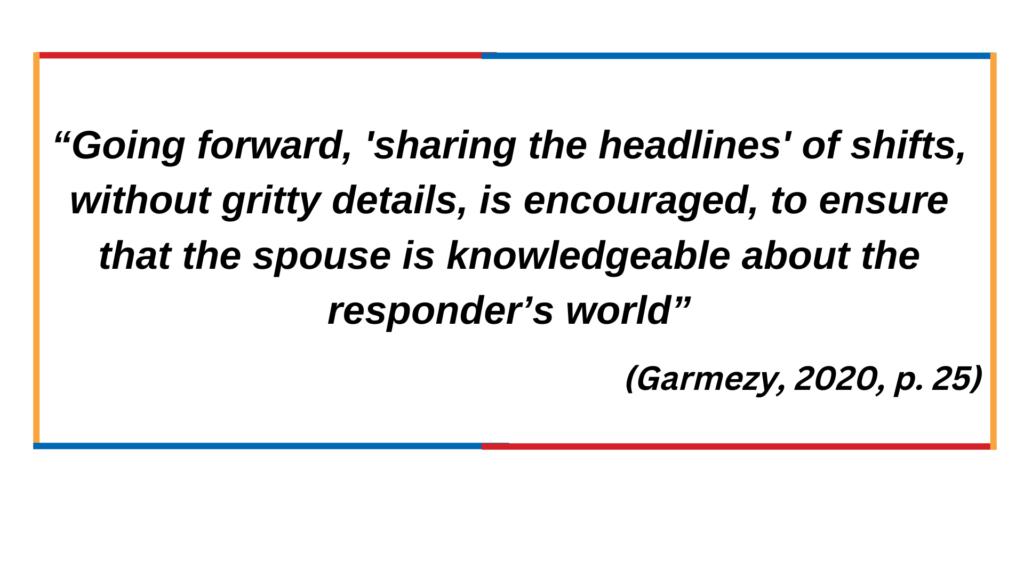Need Something More?
Check out our self-directed Spouse or Significant Other Wellbeing Course.


Indirect trauma exposure can occur when learning about a traumatic event that has happened to someone else. It can also happen to someone who provides support to a person who has been traumatized. The following table outlines signs and symptoms of indirect trauma. It is important to recognize these effects in ourselves and in others.
Experiencing a few of these symptoms for a short period of time may not be anything to worry about. However, if these symptoms persist and interfere with day to day activities, consultation with a mental health professional is recommended.
Note. Adapted from Preventing secondary traumatic stress disorder. In C.R. Figley (Ed.). Compassion fatigue: Coping with secondary traumatic stress disorder in those who treat the traumatized (1st ed.) (p. 169) by J. Yassen, 1995, Brunner Mazel. Adapted with author’s permission.
When it comes to talking about work-related traumatic events, setting boundaries about what to share and what not to share can help. Some couples find that not sharing the details about traumatic events is most helpful for them, while other couples have ground rules for sharing. It is important that you work together to establish boundaries that work for your relationship. Revisiting and renegotiating boundaries may also be needed as things change, particularly when a significant event has occurred or when there is noticeable tension that cannot be accounted for.
Working through these questions together can increase awareness of each partner’s experience, needs, and ways they feel supported. Open communication requires sensitivity and mutual respect for differences. Also keep in mind that situations and people change, and it may be useful to revisit this exercise in 6 months or a year.
Check out our self-directed Spouse or Significant Other Wellbeing Course.
CIPSRT (2020). Glossary of Terms Vicarious Traumatization. CIPSRT-ICRTSP. https://www.cipsrt-icrtsp.ca/en/glossary/vicarious-traumatization
Garmezy, L. (2020). Swimming Upstream: The First Responder’s Marriage. In C. A. Bowers, & M. R. Marks (Eds.), Mental health intervention and treatment of first responders and emergency workers (pp. 16-31). Medical Information Science Reference/IGI Global. https://doi.org/10.4018/978-1-5225-9803-9.ch002
Kim, J., Chesworth, B., Franchino-Olsen, H., & Macy, R. J. (2022). A scoping review of vicarious trauma interventions for service providers working with people who have experienced traumatic events. Trauma, Violence, & Abuse, 23(5), 1437-1460. https://doi.org/10.1177/1524838021991310
Yassen, J. (1995). Preventing secondary traumatic stress disorder. In C.R. Figley (Ed.). Compassion fatigue: Coping with secondary traumatic stress disorder in those who treat the traumatized (1st ed.). (pp. 165-189). New York: Brunner Mazel.